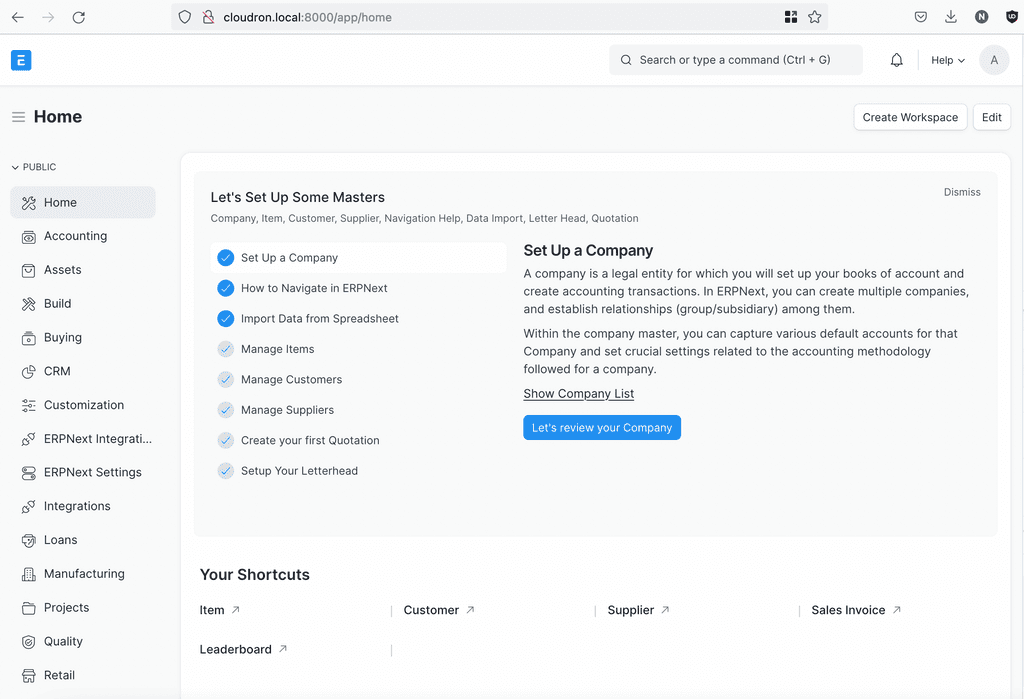ERPNext - cost-effective ERP solution
-
@nj said in ERPNext - cost-effective ERP solution:
Looks like version-14 of ERPNext does not have HR module.
They refactored the HR and Payroll module into a "new" app --> #31467. Maybe this could still be installed within the current V14 docker app --> ERPNext HRMS installation.
PS: Thank you for your hard work

-
@nj Not sure if this is what you are looking for, but if you wish to put on a donation pot, I would be happy to contribute where I can, as a token of thanks for your hard work and time!
Thank you again for all the hard work.@Aizat I'm looking for someone who know MariaDB and Python3 for the project. I've successfully packaged ErpNext, but I had to patch the source code of "Payments" and "HRMS" modules that crash the database tables during installation. Instead of cash, I'm looking for few other people who would pull the repo, and see if they see the same kind of crashes.
-
@nj I tried installing it to my cloudron and it built successfully, but I ran into an issue with the cloudron cli during installation saying that I need to specify a subdomain (when I clearly did specify a subdomain), then I ran out of time to mess with it until later this week.
-
Okay, here is the good news. Please try it out and let me know if it works.
If you're not ready to build the image yourself, you can simply install the image that I created.
cloudron install --image njsubedi/cloudron-erpnext -l erp.<yourdomain.tld>.ErpNext v14 is now available on Cloudron. See the README file for usage instructions.
Features
- ErpNext v14 - running on Frappe Framework v14
- HRMS Module - Includes HR and Payroll modules
- Plug n Play - Automatically configured to use the subdomain you install it on, no setup needed
- Independent - Does not depend on Cloudron Addons for redis, mysql or such
Gotchas
- Installs its own database servers, but data resides inside /app/data, so it gets backed-up, no not a big issue
- Hasn't been tested a lot, but it's working pretty fine
- Multi-tenancy isn't set up, even though that's pretty trivial to do
Good to know
- After installation, look into
/app/datafolder using cloudron's file manager for a file that ends with-credential.txt. - Raise issues on Github if you run into problems, not here.
-
Okay, here is the good news. Please try it out and let me know if it works.
If you're not ready to build the image yourself, you can simply install the image that I created.
cloudron install --image njsubedi/cloudron-erpnext -l erp.<yourdomain.tld>.ErpNext v14 is now available on Cloudron. See the README file for usage instructions.
Features
- ErpNext v14 - running on Frappe Framework v14
- HRMS Module - Includes HR and Payroll modules
- Plug n Play - Automatically configured to use the subdomain you install it on, no setup needed
- Independent - Does not depend on Cloudron Addons for redis, mysql or such
Gotchas
- Installs its own database servers, but data resides inside /app/data, so it gets backed-up, no not a big issue
- Hasn't been tested a lot, but it's working pretty fine
- Multi-tenancy isn't set up, even though that's pretty trivial to do
Good to know
- After installation, look into
/app/datafolder using cloudron's file manager for a file that ends with-credential.txt. - Raise issues on Github if you run into problems, not here.
@nj said in ERPNext - cost-effective ERP solution:
Okay, here is the good news. Please try it out and let me know if it works.
If you're not ready to build the image yourself, you can simply install the image that I created.
cloudron install --image njsubedi/cloudron-erpnext -l erp.<yourdomain.tld>.ErpNext v14 is now available on Cloudron. See the README file for usage instructions.
Features
- ErpNext v14 - running on Frappe Framework v14
- HRMS Module - Includes HR and Payroll modules
- Plug n Play - Automatically configured to use the subdomain you install it on, no setup needed
- Independent - Does not depend on Cloudron Addons for redis, mysql or such
Gotchas
- Installs its own database servers, but data resides inside /app/data, so it gets backed-up, no not a big issue
- Hasn't been tested a lot, but it's working pretty fine
- Multi-tenancy isn't set up, even though that's pretty trivial to do
Good to know
- After installation, look into
/app/datafolder using cloudron's file manager for a file that ends with-credential.txt. - Raise issues on Github if you run into problems, not here.
You are a Free Software hero right there, @nj !
-
Okay, here is the good news. Please try it out and let me know if it works.
If you're not ready to build the image yourself, you can simply install the image that I created.
cloudron install --image njsubedi/cloudron-erpnext -l erp.<yourdomain.tld>.ErpNext v14 is now available on Cloudron. See the README file for usage instructions.
Features
- ErpNext v14 - running on Frappe Framework v14
- HRMS Module - Includes HR and Payroll modules
- Plug n Play - Automatically configured to use the subdomain you install it on, no setup needed
- Independent - Does not depend on Cloudron Addons for redis, mysql or such
Gotchas
- Installs its own database servers, but data resides inside /app/data, so it gets backed-up, no not a big issue
- Hasn't been tested a lot, but it's working pretty fine
- Multi-tenancy isn't set up, even though that's pretty trivial to do
Good to know
- After installation, look into
/app/datafolder using cloudron's file manager for a file that ends with-credential.txt. - Raise issues on Github if you run into problems, not here.
@nj
 bonus points to you sir!
bonus points to you sir! 
-
 I infogulch referenced this topic on
I infogulch referenced this topic on
-
Can somebody review the code?
@girish what else needs to be done so that it can be released as an unstable app in the store?
Some concerns:
- only dev branch for hrms and payment module and no release (yes I'm aware that only the dev branch exists - this has to be adressed in the future)
- does not use Cloudrons Redis
- Will some of the database mitigations break the insallation in the future?
I will wait until the unstable release at the Cloudron App Store and start testing then

-
I’ve added Cloudron LDAP support. I’ll push the changes this evening.
I think I can do Cloudron redis too. Looks doable.
I think after the default site is created, I can dump the db and import that to cloudron MySQL, but still ErpNext devs recommend Mariadb support only, and it needs the database name to be the same as the db user name. Unless there’s support from Cloudron devs, it’s a blocker. But I have set db path to be inside /app/data, so backup is not an issue. Also tried migration and backup-restore, which worked fine.
Since I’m actively using it at my company I’ll keep supporting this app. Also Keycloak, Outline and Odoo.
-
I’ve added Cloudron LDAP support. I’ll push the changes this evening.
I think I can do Cloudron redis too. Looks doable.
I think after the default site is created, I can dump the db and import that to cloudron MySQL, but still ErpNext devs recommend Mariadb support only, and it needs the database name to be the same as the db user name. Unless there’s support from Cloudron devs, it’s a blocker. But I have set db path to be inside /app/data, so backup is not an issue. Also tried migration and backup-restore, which worked fine.
Since I’m actively using it at my company I’ll keep supporting this app. Also Keycloak, Outline and Odoo.
@nj Thanks for your hard work with this! I am looking forward to the day this becomes available in the app store us n00bs.

-
I’ve added Cloudron LDAP support. I’ll push the changes this evening.
I think I can do Cloudron redis too. Looks doable.
I think after the default site is created, I can dump the db and import that to cloudron MySQL, but still ErpNext devs recommend Mariadb support only, and it needs the database name to be the same as the db user name. Unless there’s support from Cloudron devs, it’s a blocker. But I have set db path to be inside /app/data, so backup is not an issue. Also tried migration and backup-restore, which worked fine.
Since I’m actively using it at my company I’ll keep supporting this app. Also Keycloak, Outline and Odoo.
-
Trailer

You know what's disappointing? I started packaging ERPNext for the HR module. Unfortunately, the HR Module is not available after installation. Now I'm here thinking where the hell it go, and why I spent weeks packaging something that doesn't have the particular module I was looking for.
Update: Looks like
version-14of ERPNext does not have HR module. Onlyversion-13has it. Now packaging version 13.
Now packaging version 13.
@nj ERPNext 14 also have an LMS, right?
-
@nj ERPNext 14 also have an LMS, right?
@mdreira said in ERPNext - cost-effective ERP solution:
@nj ERPNext 14 also have an LMS, right?
Seem like yes, indeed, as it is written on the quoted page. And it seems to be very powerful as well.
-
@mdreira said in ERPNext - cost-effective ERP solution:
@nj ERPNext 14 also have an LMS, right?
Seem like yes, indeed, as it is written on the quoted page. And it seems to be very powerful as well.
-
@mdreira The big gotchya with Odoo is that the most useful part of it, the Studio addon, is not in the community edition.
With ERPNext, their equivalent no-code custom data model builder is included.
-
Okay, here is the good news. Please try it out and let me know if it works.
If you're not ready to build the image yourself, you can simply install the image that I created.
cloudron install --image njsubedi/cloudron-erpnext -l erp.<yourdomain.tld>.ErpNext v14 is now available on Cloudron. See the README file for usage instructions.
Features
- ErpNext v14 - running on Frappe Framework v14
- HRMS Module - Includes HR and Payroll modules
- Plug n Play - Automatically configured to use the subdomain you install it on, no setup needed
- Independent - Does not depend on Cloudron Addons for redis, mysql or such
Gotchas
- Installs its own database servers, but data resides inside /app/data, so it gets backed-up, no not a big issue
- Hasn't been tested a lot, but it's working pretty fine
- Multi-tenancy isn't set up, even though that's pretty trivial to do
Good to know
- After installation, look into
/app/datafolder using cloudron's file manager for a file that ends with-credential.txt. - Raise issues on Github if you run into problems, not here.
